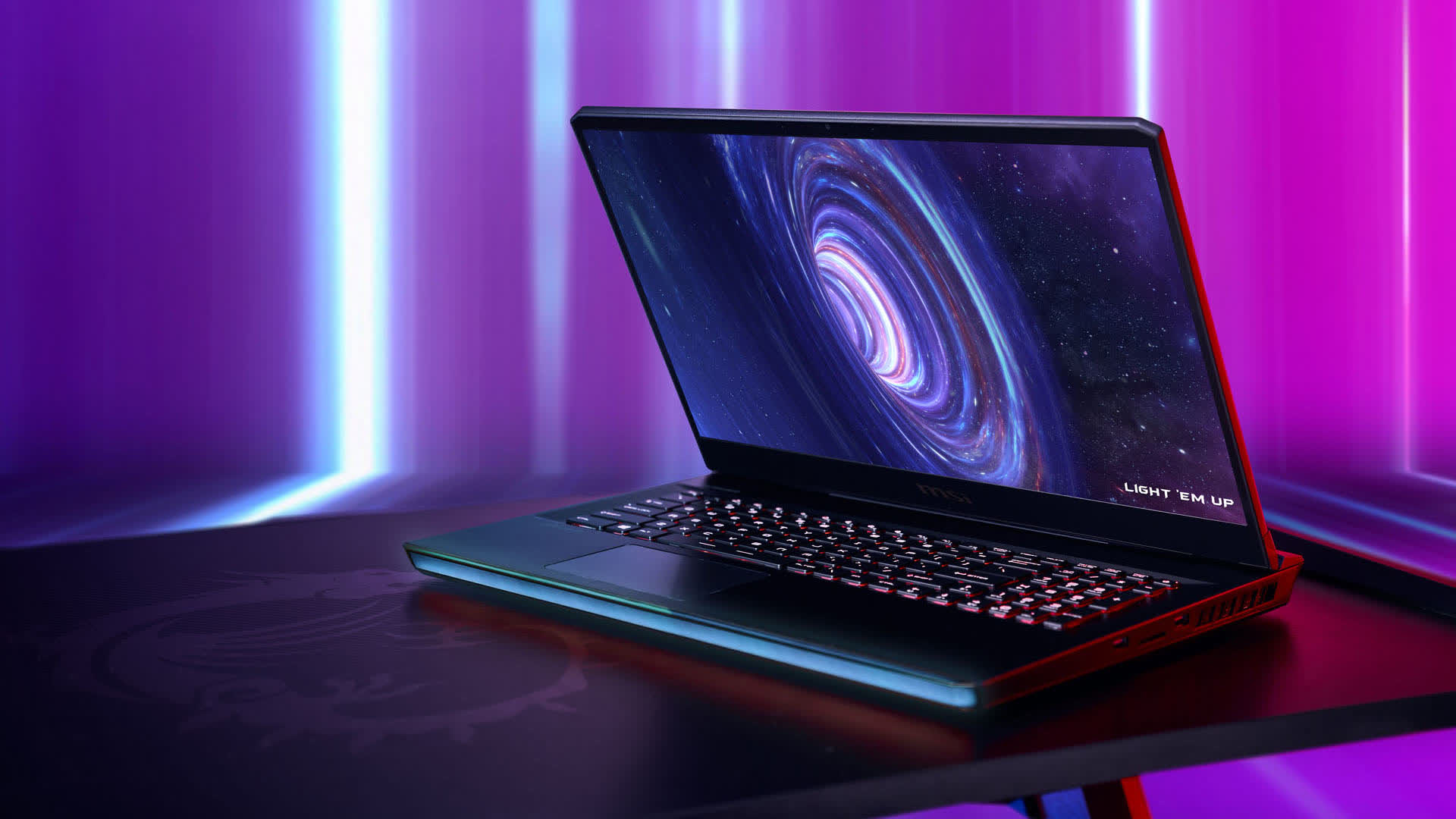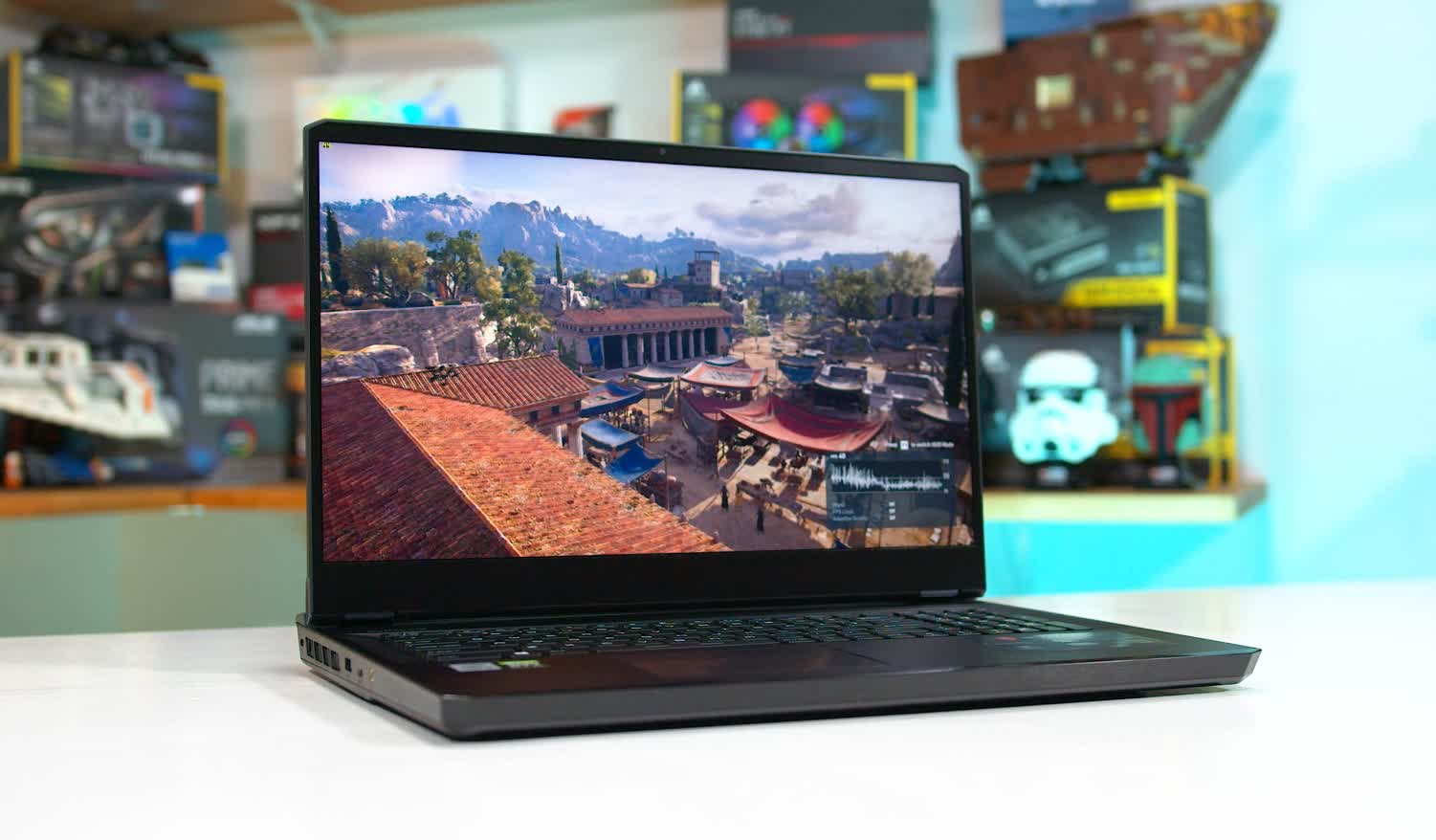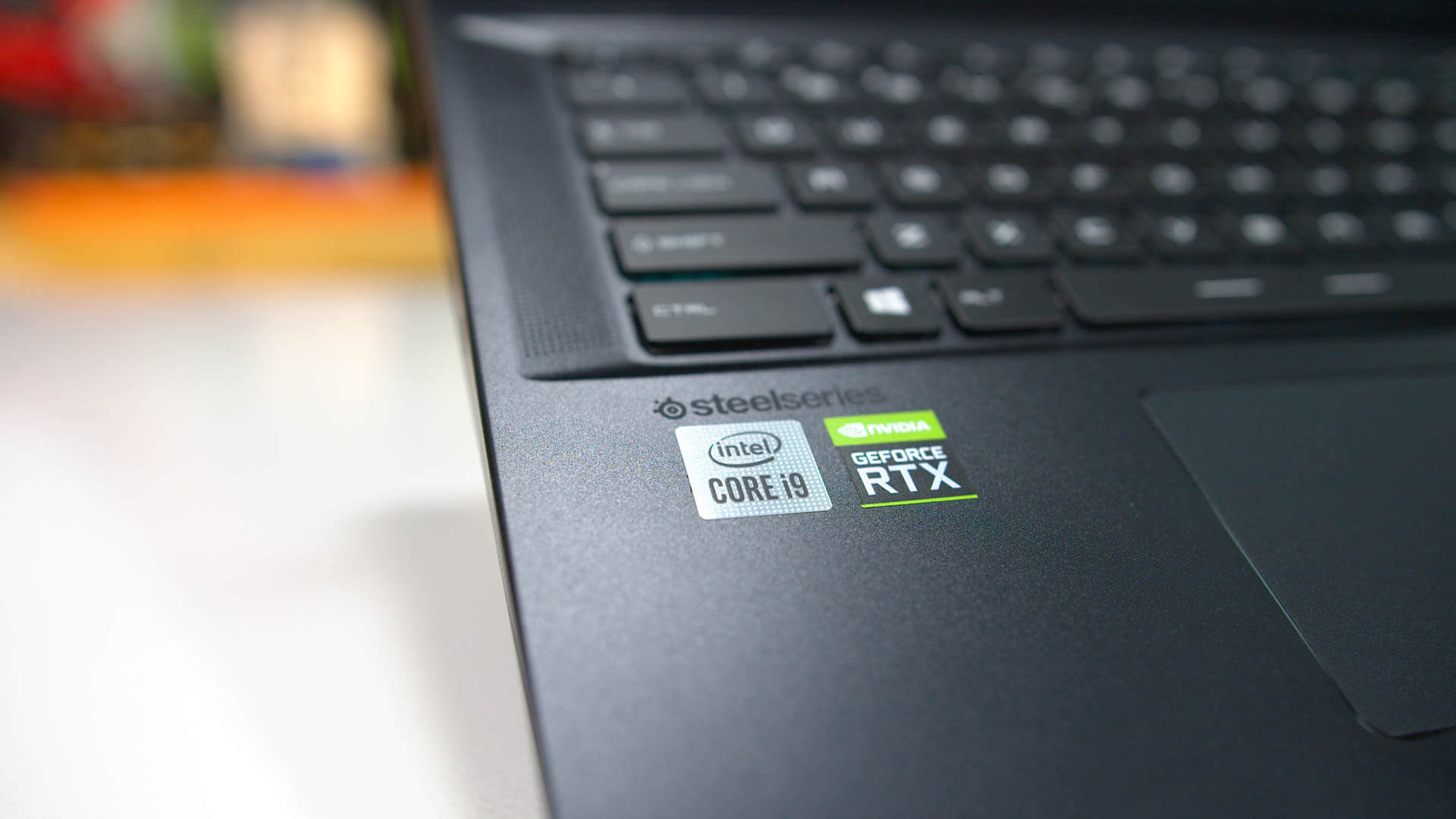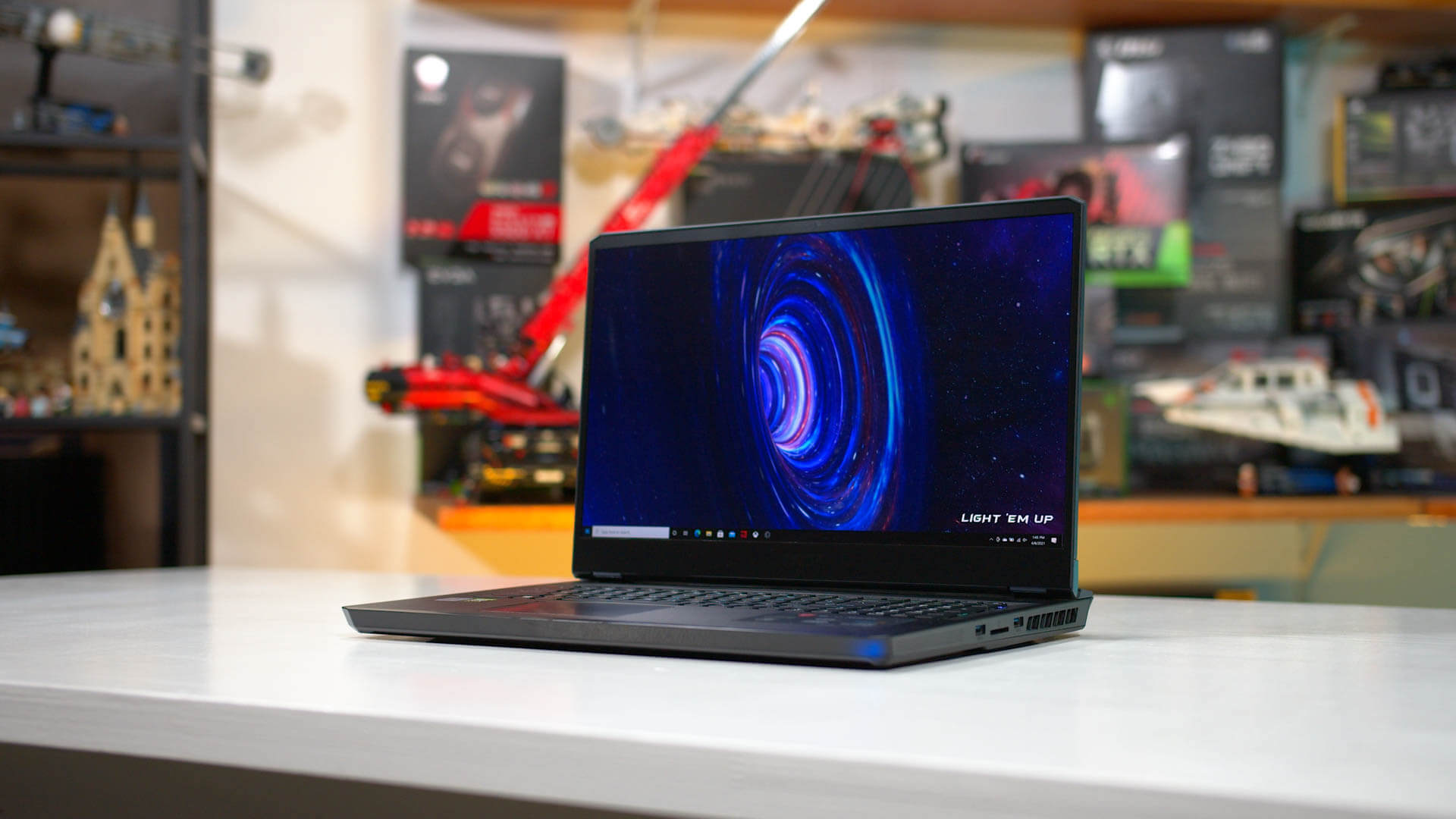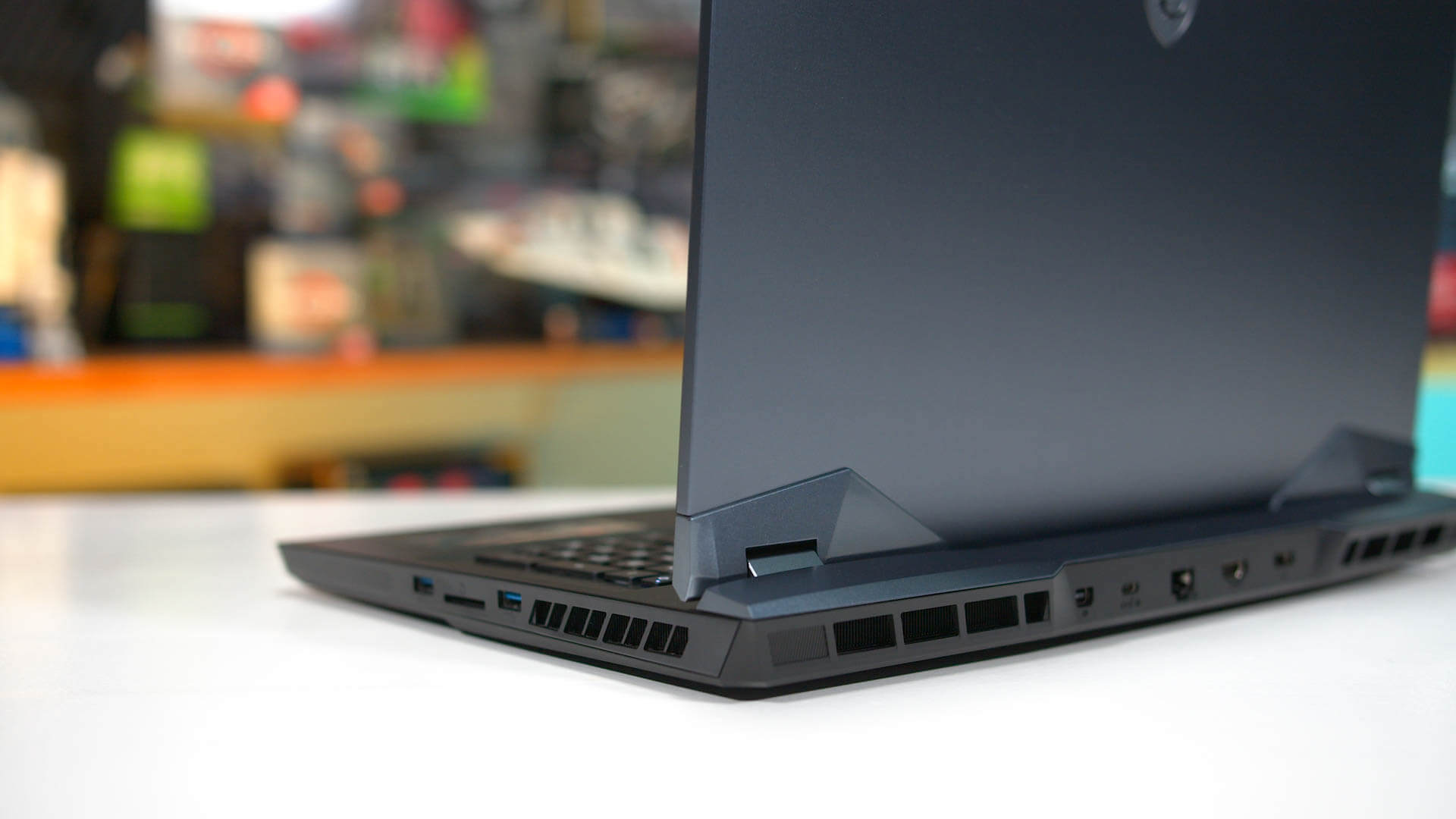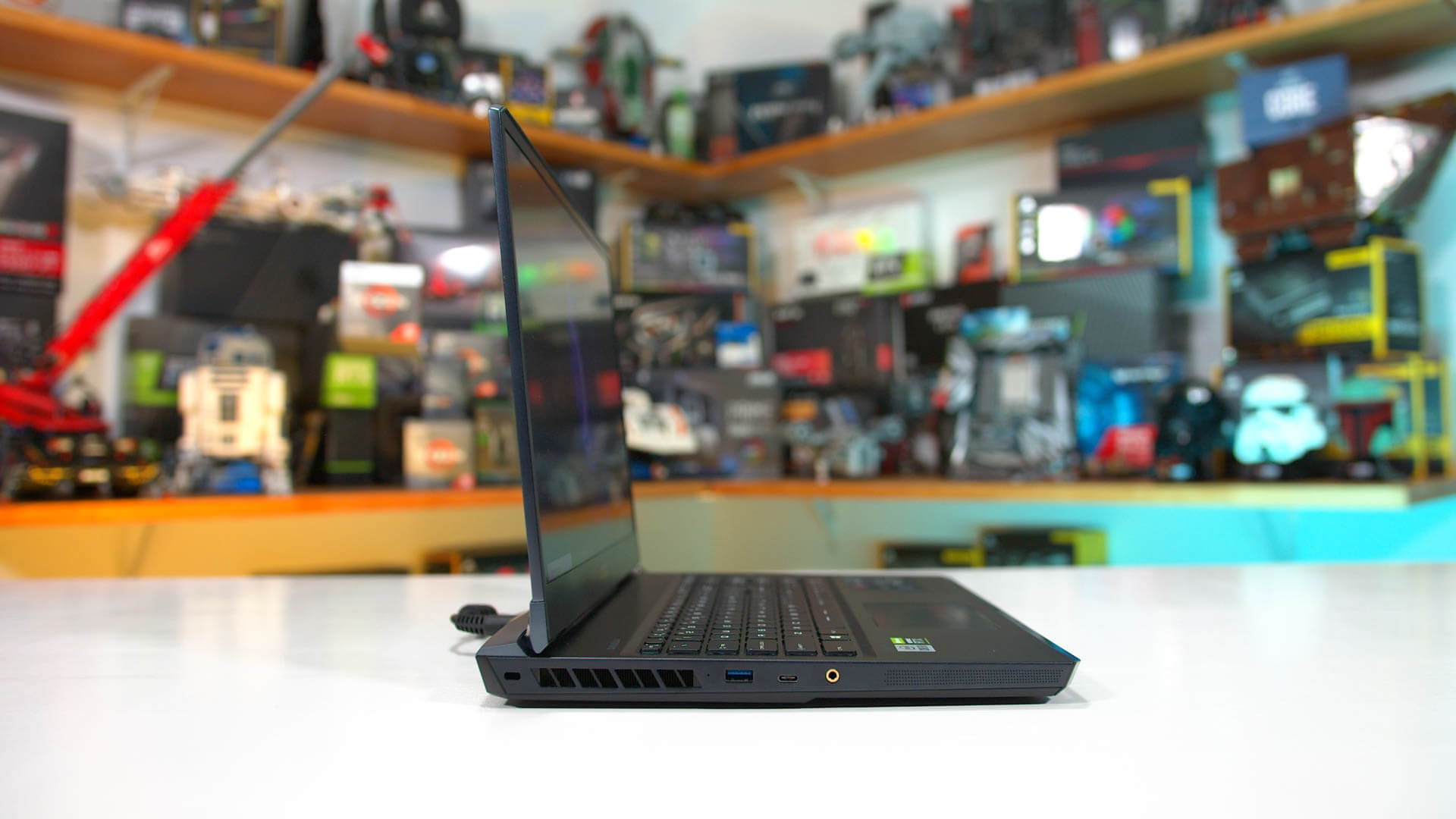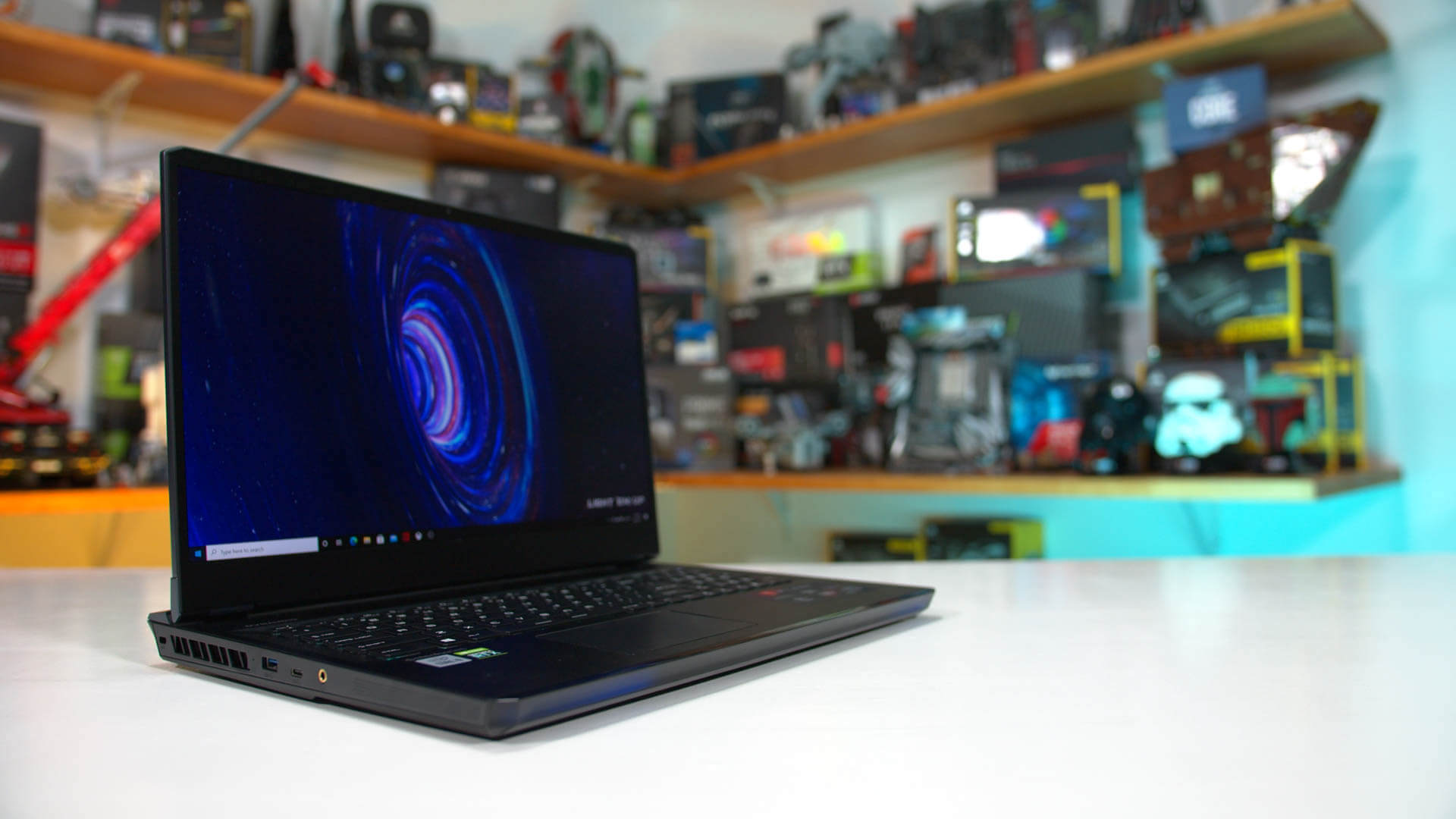The GeForce RTX 3080 currently sits at the top of Nvidia laptop GPU offerings and is usually the graphics processor of choice for flagship gaming machines that are powered with Core i9 or Ryzen 9 CPUs, offering the best of the best in a portable form factor.
The RTX 3080 has been available for weeks now, it packs 6144 CUDA cores, 20% more than in the RTX 3070 Laptop GPU, and is configurable to a range of power levels which will dictate final performance output, in this case anywhere from 80W to above 150W. This results in a maximum boost clock range of 1245 MHz to 1710 MHz depending on the configuration. The memory subsystem includes 8 or 16GB of GDDR6 on a 256-bit bus.
While this presents a healthy specification bump over the RTX 3070 Laptop GPU, it's substantially different to what you get on a desktop RTX 3080. Nvidia isn't using the same GPU die either: this is GA104 on laptops, rather than the GA102 used for its desktop counterpart. So far, this is the only mobile GPU in the series that differs on the actual GPU die being used.
As a result, the laptop part features 48 SMs, down from 68 in the desktop, leading to a significant 29% reduction in CUDA core count. Clock speeds can be the same depending on the power level, but we also see a drop from GDDR6X memory to just GDDR6 which brings lower memory bandwidth. Of course, this sort of spec differences make sense as you can't just take a 320W desktop GPU, put it in laptops and call it a day. However these differences can be confusing for less tech savvy buyers to whom it may not be obvious that the desktop and laptop GPUs are drastically different though they have virtually the same name.
Part of today's review will be comparing the performance of the laptop and desktop variants, but we'll also be showing the RTX 3080 Laptop GPU up against other recent mobile products, so you'll get a good idea how it performs overall.
The test system for today's benchmarking is the MSI GE76 Raider, a high-end 17" system equipped with flagship specifications. The model we received from MSI to test, the 10UH, packs the 16GB variant of the RTX 3080 with a power range of 135-155W: base limit at 135W with an extra 20W available through Dynamic Boost 2.0.
The GE76 Raider also includes a Core i9-10980HK processor – 11th-gen variants will be available soon, but for now we have 10th-gen data – 32GB of DDR4-3200 memory, and an ample 17.3-inch 1080p 240Hz IPS display. I'm quite a fan of MSI's Raider designs this generation, the build quality is excellent and while this is a bigger laptop, it's not a ridiculously huge system; it retains portability without sacrificing on the cooling necessary for an RTX 3080 and Core i9 CPU.
Today we are testing the RTX 3080 Laptop GPU at two resolutions: 1080p with Nvidia Optimus enabled, so the display is connected to the iGPU; and 1440p with an external display connected directly to the discrete GPU. Let's get into the benchmarks.
Benchmarks

First up is Metro Exodus. At 1080p using Ultra settings, the RTX 3080 Laptop GPU is able to sustain 119 FPS on average in our benchmark pass which delivers quite a decent high refresh rate experience on modern internal laptop displays. This is 13% faster than the RTX 3070 running at 115W, however it still means the RTX 3080 Laptop falls well short of the RTX 3070 in desktops. At 1080p we're 25% behind the desktop RTX 3080 here.

At 1440p it's a slightly more positive story for the RTX 3080 in laptops. While the margin to the desktop part has grown compared to at 1080p, the RTX 3080 Laptop is now quite a bit faster than the RTX 3070 Laptop. Now there is a bit of a power discrepancy here, 135W vs 115W, however this does generally appear to be the case in most laptops when you look at how RTX 3070 and RTX 3080 models are configured. In this instance the RTX 3080 is 17% more powerful.

Borderlands 3 is an example of a game that when played at 1080p in a laptop is generally going to be more CPU limited than GPU limited. You can see that here with an instance where the RTX 3070 Laptop configured with a Ryzen 9 5900HX slightly outperforms this RTX 3080 Laptop with the Core i9-10980HK, now Ryzen isn't always faster in CPU limited games than the Core i9 but in this instance it is, so we see performance fall slightly behind. It's important to show these cases as not every game will be GPU limited on your laptop.

At 1440p we get a much better look at how these GPUs actually stack up for gaming performance when GPU limited. The RTX 3080 Laptop GPU is 18% faster than the RTX 3070 Laptop, and quite a significant 41% faster than the RTX 3060 Laptop. However, the RTX 3080 Laptop still fails to beat the desktop RTX 3070, and overall ends up 16% slower than the desktop RTX 3080 which carries the same name.

In Red Dead Redemption 2 at 1080p, the RTX 3080 Laptop presents a small performance increase over the RTX 3070, in the range of 10%. In this title at this resolution, it gets demolished by a desktop configuration, coming in 30% slower than the RTX 3080 desktop model and still behind the RTX 3070 for desktops.

At 1440p the results are quite decent for the RTX 3080 Laptop configuration, closing the gap to the RTX 3070 desktop model and delivering an experience consistently over 60 FPS using High settings. The RTX 3080 Laptop is now 20% faster than the RTX 3070 Laptop which is twice the margin we just saw at 1080p, and while it's still 30% slower than its desktop equivalent, you'll get a decent experience here.

In Assassin's Creed Valhalla at 1080p, we see a smaller than usual margin between the laptop and desktop variants. Here the laptop model is just 21% slower. We also see a modest but healthy margin between the RTX 3080 and RTX 3070 for laptops, at 14%, not too bad in this sort of title.

That margin holds steady at 1440p, but now the RTX 3080 Laptop is within touching distance of the RTX 3070 in the desktop, we're just 5% slower here. Getting essentially the performance of an RTX 2080 Ti in a laptop at just 140W or so is pretty impressive given this sort of performance was not possible with prior generation hardware.

These days everyone wants to know how a GPU performs in Cyberpunk 2077 so here are the results. The RTX 3080 Laptop GPU comes in 19% faster than the RTX 3070 Laptop at 1080p, one of the largest margins we've seen so far in this GPU heavy game running at ultra settings. As such, the RTX 3080 Laptop is also 32% slower than its desktop counterpart.

As this title is so GPU demanding we see pretty similar margins pop up when testing at 1440p. Again the margins to desktop cards are not very impressive for the laptop part, however with a few settings tweaks you could easily get this game running at over 60 FPS at 1440p

In Watch Dogs Legion at 1080p, the RTX 3080 Laptop GPU is providing performance slightly behind an RTX 3070 desktop configuration, and about 15% more frames than an RTX 3070 Laptop GPU. This is again one of the small margins between the desktop and laptop variants, the laptop variant is around 13% slower.

At 1440p the RTX 3080 Laptop is almost matching the performance of the desktop RTX 3070, so that's not a bad result for a significantly lower power laptop equivalent, although ultimately it still falls well short of what the desktop RTX 3080 can do. Meanwhile, in the laptop space the RTX 3080 performs well, delivering 19% better performance than the RTX 3070 for laptops.

Death Stranding at 1080p is another title which is CPU limited in modern laptop form factors, as you can see from the results comparing the Core i9 and Ryzen 9 laptops. So this is another good reminder that not all games you play will benefit from the faster RTX 3080 GPU, as at 1080p we are right on the border of being CPU limited. For this sort of game it makes a lot more sense to pick a laptop with a good CPU.

However the situation is very different at 1440p. Now there is a more noticeable step up in performance comparing the RTX 3080 Laptop GPU to the RTX 3070 Laptop GPU, a 16% performance increase. The margin to the desktop configurations also shrinks, we're now just 22% slower than the RTX 3080 desktop version, and 12% slower than the RTX 3070.

The final title we'll be looking at in detail today is Horizon Zero Dawn. This game is GPU limited at 1080p using the Ultimate Quality preset, so again we see about a 15% performance increase moving from the RTX 3070 Laptop to the RTX 3080 Laptop, one of the higher margins in our testing so far. However we are still 26% slower than the desktop equivalent GPU.

At 1440p it's a fairly similar situation, although to be honest the RTX 3080 Laptop GPU is delivering nearly 100 FPS on average here which is a great result for a laptop GPU given what we've seen from other models available.
Performance Comparisons
Before jumping into the conclusion, here's a look at some head to head comparisons in a larger range of games.
RTX 3080 Laptop vs RTX 3070 Laptop
When comparing the RTX 3080 Laptop to the RTX 3070 Laptop in a higher power class, most of the time the 3080 will be delivering between 10 and 15 percent more performance.

However at times the platform will be CPU limited, and given the CPU differences here (Ryzen 9 5900HX for the 3070, and Core i9-10980HK for the 3080), we do see slower performance. So that's something to keep in mind.

When fully GPU-limited using a 1440p external display hooked up directly to the discrete graphics, we no longer see any instances of being CPU-limited. On average, the RTX 3080 Laptop configuration is 19% faster, so this gives you a good idea of what is possible in the best case scenario. In general though, when you factor in the 1080p results, when GPU-limited you should be seeing performance 10 to 20 percent higher than the lower-tier GPU.
RTX 3080 Laptop vs RTX 3080 Desktop
In terms of a laptop vs desktop comparison, at 1080p on average the laptop variant is 25 percent slower. This performance ranges from just a 10% margin right up to 35% depending on the title, and in some of the most GPU demanding games the margin is often around 30%.


That margin is about the same at 1440p, the RTX 3080 Laptop is 25% slower than the RTX 3080 desktop variant.
RTX 3080 Laptop vs RTX 3070 Desktop
That also means the RTX 3080 Laptop GPU is also not able to match the performance of the RTX 3070 desktop GPU: in our testing at 1440p it's 9% slower on average. Based on our prior testing of these desktop GPUs, that would place the RTX 3080 Laptop when running at 135-155W slightly above the RTX 3060 Ti and slightly behind the last-gen RTX 2080 Ti.

Obviously the laptop and desktop variants don't deliver the same performance, we've known that for a while now, but this does give us a good look at how the margins stack up. Keep in mind this mobile GPU maximum TGP of 155W, which compares to 200W for the RTX 3060 Ti and 250W for the RTX 2080 Ti, we are seeing quite good efficiency to shave off 50-100W and still maintain that level of performance.
What We Learned
My overall thoughts on the RTX 3080 Laptop GPU are similar to my thoughts on the RTX 3070 Laptop GPU, and so this section needs to be split in two: first covering laptop GPUs only, and then talking about the desktop comparison.
Purely talking laptops, the RTX 3080 Laptop provides a decent performance improvement over the RTX 3070 depending on how CPU limited your gaming will be. At 1440p, it's quite good and I think there's enough power available here to deliver a smooth gaming experience on newer laptop displays that are coming out with a 1440p resolution. At times, this GPU is over 40% faster than the RTX 3060 Laptop in the higher power tier (Max-P) which does enable gaming at these higher resolutions.
This margin between 3070 and 3080 is similar to what we see on the desktop cards, where the 3080 is about 20% faster than the 3070 at 1440p when mostly GPU limited. You just have to make sure you are going to be playing GPU limited titles, as the RTX 3080 is powerful enough to run into bottlenecks at 1080p even with a high-end laptop CPU.
It also appears to be possible to get an RTX 3080 Laptop without paying a ridiculous premium. Take the upcoming Gigabyte Aorus 15P, this is just one example, but the RTX 3080 model costs 26% more and also packs double the RAM for what should end up around 15% better performance when GPU limited. That's surprisingly reasonable.
On the other hand, you will run into situations where laptop manufacturers will up-spec the RTX 3080 model and charge a larger premium. That's the case with the new 11th-gen variants of the MSI GE76 Raider that I looked at: the RTX 3070 model with a Core i7 costs $2,600, but going for the RTX 3080 variant also forces you to upgrade to a Core i9 processor, and MSI is charging $3,400 or a 31% premium for that privilege.
I was also impressed with the efficiency of this part. The RTX 3080 is now giving laptop gamers just below the power of an RTX 2080 Ti in a portable form factor. That is if you completely avoid models that run the GPU at 80W, which will no doubt be far worse and not worth the asking price.
Now, when you compare the RTX 3080 against its desktop equivalent, it gets a bit embarrassing. The laptop GPU is nowhere near the performance of the RTX 3080 on desktops and so these two products should not have the same name.
In the configurations I tested, the RTX 3080 desktop card was 33% faster than the RTX 3080 Laptop GPU running in the upper range of its power limits: 135-155W. This margin will only grow with lower power configurations, after all, the RTX 3080 can be used all the way down to 80W.
Normally this isn't an issue. You would of course expect a high-end desktop GPU to outperform the best laptop GPU simply because a desktop can allocate twice the power budget. But because performance is different - and in this case even the GPU die itself is different - these two products should have distinctly different names to avoid any confusion among buyers.
We like to explain this for two reasons: the first is that casual buyers may not do a ton of research into the hardware (e.g. non PC enthusiasts buying gaming laptops). The second reason relates to today's market with horrendous GPU pricing. A talking point I've heard several times as of late is that "you could either buy a GPU for thousands of dollars on the scalper market or just buy a gaming laptop." I've even heard some say that gaming laptops are great value now.
But we know that's only true if you ignore the performance discrepancy between laptops and desktops. Yes, spending $2,300 on an RTX 3080 laptop is a lot more appealing than spending $2,700 on an RTX 3080 on eBay. But is it more appealing than spending $1,600 on an RTX 3060 Ti or RTX 3070? But wait... it's not like anyone is recommending you buy a desktop card right now.
Historically, laptops have never been as good value as desktops for gaming, but it's interesting to see this still playing out today despite reasonably normal laptop prices and awful graphics card prices.
To conclude, I'll put it this way... the RTX 3080 Laptop GPU falls short in the desktop vs. laptop comparison, but the "RTX 3080 M" is a genuinely great laptop GPU. You can get RTX 2080 Ti-like performance in a portable system and that's simply fantastic.
